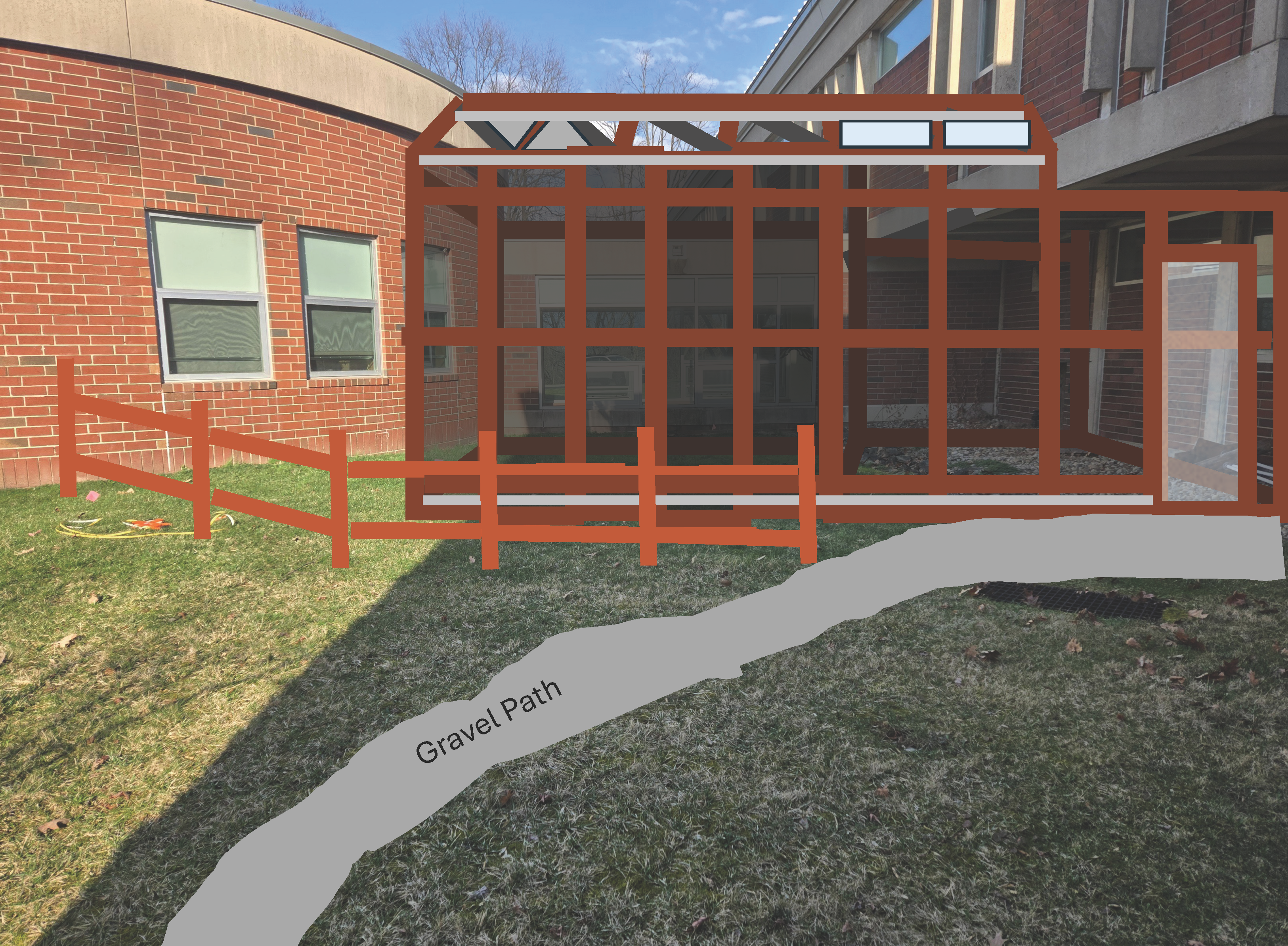LATROBE, PA – Construction of the Saint Vincent Aviary is scheduled to begin on Tuesday, Nov. 18, near the Sis and Herman Dupré Science Pavilion on the campus of Saint Vincent College.
The 522-square-foot facility will consist of one outdoor enclosure for a hawk, which will serve as an ambassador bird, plus an additional bird-handling area used for training and public presentations. The 12-foot-tall structure will be nestled between two of the seven buildings forming the Dupré Pavilion.
“This location is perfect for keeping the animals sheltered and safe while also keeping them close enough for daily student interaction,” said Dr. James Kellam, professor of biology within SVC’s Herbert W. Boyer School of Natural Sciences, Mathematics and Computing, and developer of the Saint Vincent Aviary.
Kellam is no stranger to the Saint Vincent community, routinely leading campus bird walks by the nearby lake and wetlands, Winnie Palmer Nature Reserve, the woods behind the monastery and in the Saint Vincent Cemetery. It’s all part of Kellam’s ultimate goal of teaching students to love nature, he said, both for their own benefit and for the birds that call it home.
“Every professor I know has fallen in love with their subject matter and wants students to feel the same way as they do,” Kellam said. “That is what this aviary means to me—it is an opportunity to share my love for birds with others. My life is enriched by birds in intellectual, emotional and spiritual ways, and I want that to be true for others as well.”
The aviary will be used to enhance the College’s curriculum, help train pre-veterinary students, contribute to campus events and educate the public about bird conservation. Kellam teaches various courses with birds as the central focus, including Biology of Birds, World Series of Birds and Ornithology.
Existing lab space inside the Dupré Pavilion will allow caretakers to access cold storage and counterspace to prepare food, said Kellam, who will supervise bird care and train students to provide daily food and water. A veterinarian will provide regular checkups and be on-call for any emergency health concerns.
“Pre-vet students in the Biological Sciences Department will gain extraordinary experience by attending these visits,” Kellam said, adding that many such students already volunteer at Wildlife Works, Inc., a wildlife rehabilitation center located in Youngwood.
The bird enclosure will feature wire-mesh walls with a wood frame; cut tree trunks and limbs will be installed to mimic natural conditions.
“Our hawk will be a hardy species that can stay warm in winter while outdoors,” Kellam said. Much like outdoor enclosures at larger aviary facilities, however, the Saint Vincent Aviary will feature a powerful infrared heater to provide extra warmth should the bird need it. Water bowls large enough for bathing will be heated to ensure no freezing occurs.
When construction is completed, an ambassador bird will be chosen from those available from wildlife rehabilitators, state agencies or private raptor centers. In addition to utilizing the ambassador bird in science classes and student research projects, Kellam said the College has yet another opportunity to reach out to the community.
“We want to invite outside groups to come to campus to see our bird and participate in educational activities relating to conservation,” he said, adding that invitations would be extended to school and church groups, Scout troops, alumni and prospective SVC students.
These educational activities will be twofold: while the community at large will benefit, current Saint Vincent students will accompany the bird and be responsible for some of the presentations.
“This will give them experience in public speaking and teaching that could help them obtain jobs in environmental education,” Kellam said. “Many of our students already pursue employment at the Pittsburgh Zoo & Aquarium, the National Aviary and Powdermill Nature Reserve, where these kinds of presentations are commonplace.”
This first enclosure, funded by a private gift, is a trial run for a larger facility that Kellam hopes to see constructed at the College within the next few years. Such an initiative would allow for more ambassador birds to be housed on campus and expand learning opportunities.
“The ambassador birds, our students, our guests and members of the public will all benefit from this facility,” Kellam said. “We’ve had sustained energy in ornithology at Saint Vincent College for many years, and the Saint Vincent Aviary will bring it forward even more. I think we’ll make a difference for people and birds alike.”
In a broad sense, fostering a human-bird connection has been a part of the College’s mission from its very beginning. Saint Benedict, who founded the Benedictine Order, befriended a raven, which protected him by carrying off a loaf of poisoned bread. That relationship’s significance is captured on the Saint Benedict Medal.
“Birds do make remarkable wild companions that help us relate to nature and to God,” Kellam said. “Birds clearly illustrate beauty in their color and song, fragility and miracle in their ability to fly, and endurance in their migrations and survival.”
ArTECH Group, LLC, is scheduled to begin construction on Tuesday, Nov. 18, and complete the project within approximately 30 days.
